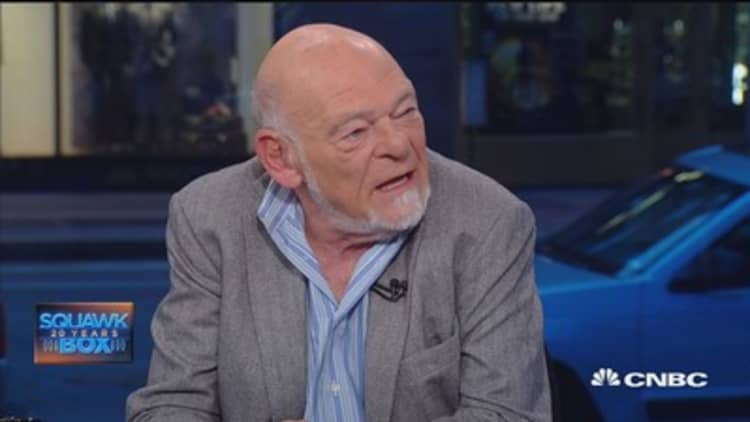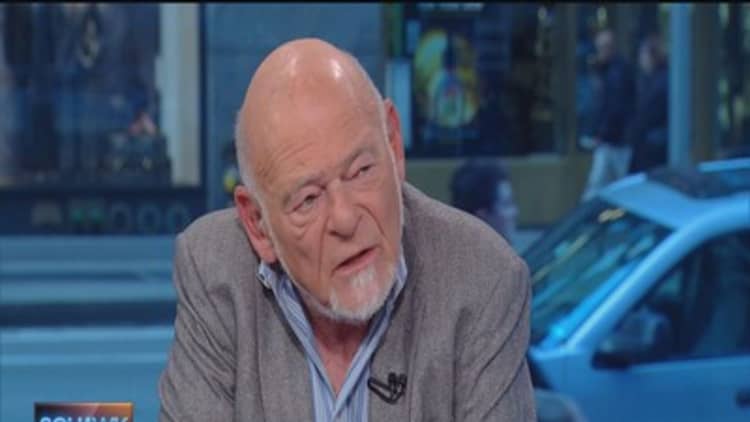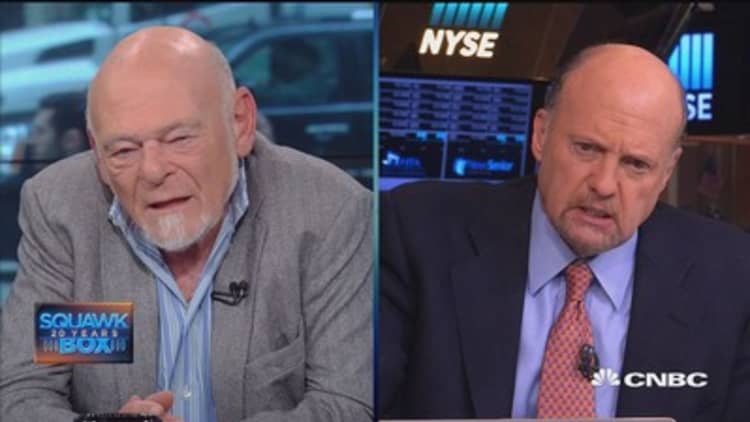


The stock market is out of sync with Main Street, billionaire investor Sam Zell said Wednesday.
"The best example I can give you was [a week ago] Monday when the stock market was ... down 300 [points] and everything was horrific," Zell said. "I looked at the screen and said I don't think there's anything that I want to buy."
"I didn't see anything that jumped up and said ... that's value," he said. "We subsequently had a recovery that I don't think fits any economic judgment."
He added, "There's a significant missing of demand, not only in the United States but worldwide."
The chairman of Equity Group Investments told CNBC's "Squawk Box" there continues to be a disparity between reality and Wall Street.
The last time he was on the program in April, Zell predicted a correction in the stock market, which came to pass in recent months.
He said Wednesday that understanding what quantitative easing and low interest rates from the Federal Reserve actually means for stocks remains a long way off.
"There are people who say we may see more quantitative easing as the [economic] slowdown continues," Zell pointed out, but argued the Fed has been too easy. "I think we've allowed interest rates to be too low for too long."
He said near-zero percent rates for six years "changes behavior," taking away the urgency to do deals and make investments. "The Fed should have raised a long time ago," he said.
"The [U.S.] economy is at the moment is OK, but so much of the economy is predicated on noneconomic issues," he said. "There's an awful lot of equity money fueling jobs out there."
Zell also described what he called "a lot of substandard jobs that now qualify as being employed but don't create any opportunity for these people to grow further."
Equity Group Investments, founded by Zell more than four decades ago, started and remains heavily focused in real estate. The firm also has equity stakes in energy, logistics, manufacturing, transportation and communications, as well as fixed-income interests in public and private companies.
Zell: De-suburbanization of America
Looking at the housing recovery, Zell said, "We're going through a pretty significant change in the definition of ... what works. I would call it a de-suburbanization of America."
"Today, particularly with the deferral of marriage, the demographics are changing," he said. "What is this the eighth year of the recovery ... and we're still building only 50 percent of the houses that we built on average for the last 20 years."
The demand is down because new college graduates are not buying a "house in ticky tacky-ville," Zell said. "They're moving to New York [City], Chicago, or San Francisco, and living in our apartments."
The CEOs of homebuilder Toll Brothers and Home Depot told "Squawk Box" last week that the notion of the "death of the suburbs" has been greatly overstated based on their vantage points.
Millennials, loosely defined as people born in the early 1980s through the late 1990s, want to buy homes in the suburbs, they're just taking longer, said Doug Yearley at Toll Brothers and Home Depot's Craig Menear.
Zell countered on Wednesday, saying there are no hard statistics to back up those claims.
Zell: Student loans an entitlement gone 'crazy'
On the issue of the nation's soaring student loan debt, currently more than $1.2 trillion, Zell told CNBC: "Student loans is just another example of an entitlement that's been allowed to go crazy."
He largely blames the colleges: "[They're] raising costs because they can, not necessarily because they have to, if they were implementing the same discipline that they often recommend for the federal government."
Calling it a "very, very serious problem," he said crushing student loans are putting new college graduates in the hole right off the bat.
But Zell also said there needs to be a push to make students aware of the importance of pursuing degrees in fields that can get them jobs.


